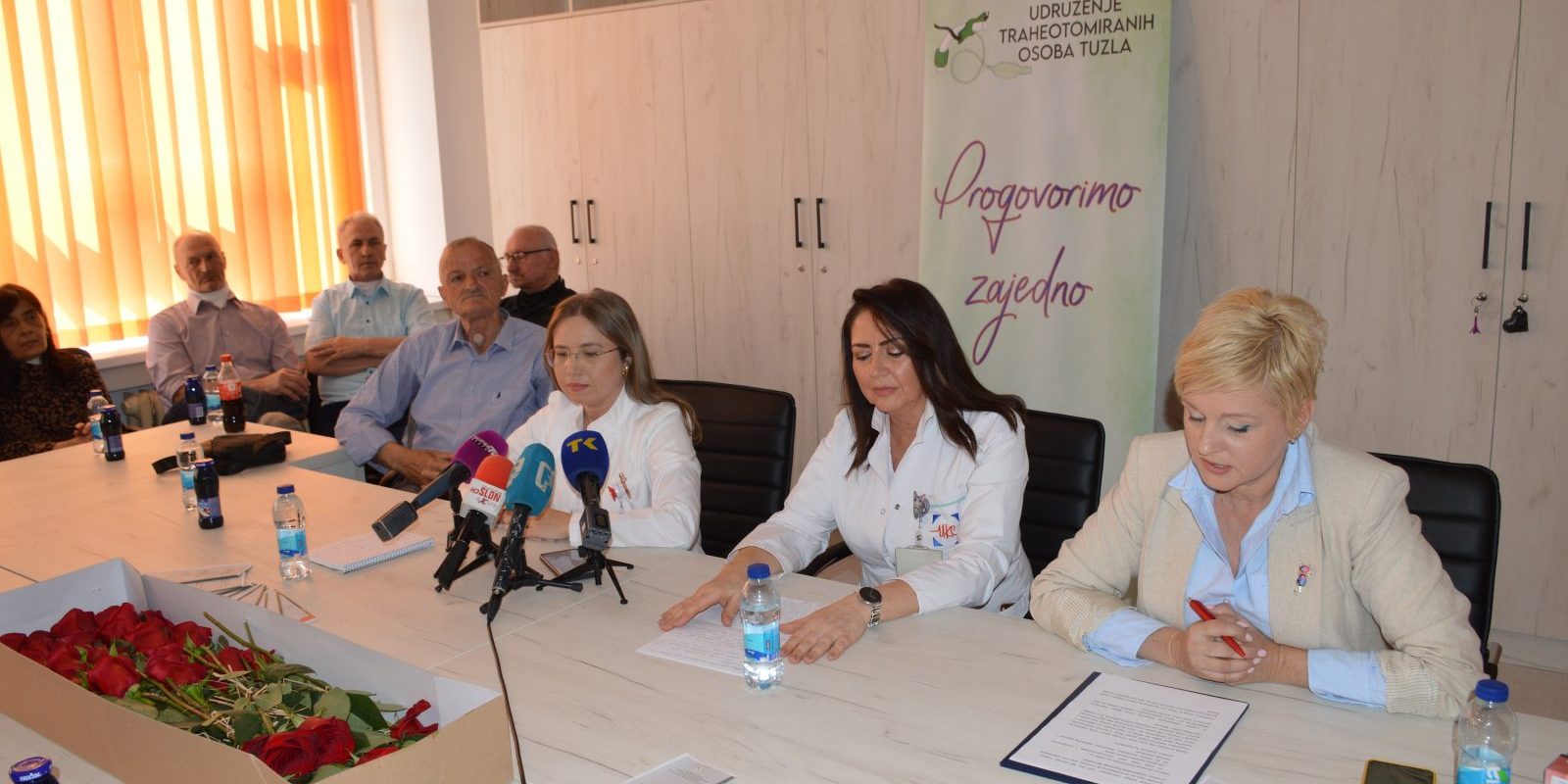In recognition of World Voice Day, the Clinic for Ear, Nose and Throat Diseases and Head and Neck Surgery at the University Clinical Center Tuzla, in collaboration with the Association of Tracheotomized Persons Tuzla, organized a press conference to highlight the importance of vocal health.
During the event, they announced a series of planned activities aimed at raising awareness among both patients and the general public about persistent voice changes and hoarseness. These symptoms, if lasting for an extended period, can be early indicators of vocal cord tumors.
The organizers emphasized the critical importance of early diagnosis and timely treatment in improving patient outcomes. Through education and outreach, they aim to encourage individuals to seek medical attention promptly when experiencing voice-related symptoms.
Dr. Lejla Tokić, specialist in otorhinolaryngology and president of the Association of Tracheostomized Persons Tuzla, addressed the press on the occasion of World Voice Day, emphasizing the importance of preventive check-ups and timely diagnostics. She pointed out that laryngeal cancer most commonly originates from the vocal cords and often presents early through persistent hoarseness.
“Anyone experiencing hoarseness lasting longer than two to three weeks should seek medical attention,” Dr. Tokić stated. “If deemed necessary, the physician will refer the patient for further evaluation and a biopsy. The treatment of laryngeal cancer depends on its stage and precise location.”
She expressed pride in the Association’s members, highlighting that some individuals who underwent total laryngectomy more than 15 years ago remain active and engaged within the organization.
“The core idea behind founding the Association of Tracheostomized Persons is the belief that mutual support and open dialogue can significantly improve quality of life after total laryngectomy,” said Dr. Tokić. “Our Association brings together tracheostomized individuals, their families, and friends to form a community that offers support, shares experiences, and promotes positive change for both patients and the broader public.”
Dr. Sc. Selma Altumbabić, speech therapist, spoke about the importance of vocal hygiene and when individuals should seek the help of a speech therapist.
“Following a multidisciplinary diagnostic evaluation, patients diagnosed with voice changes are referred to the Phoniatrics Department for further assessment by a speech therapist,” explained Dr. Altumbabić. “At that point, a detailed diagnostic evaluation is conducted, including the assessment of articulation and language status, followed by the development of a speech rehabilitation plan.”
Patient Nuraga Moćić shared his personal experience after undergoing a laryngectomy. He underscored the vital role of the Association of Tracheostomized Persons Tuzla, noting that its activities and social support significantly enhance the quality of life for oncology patients.
Moćić also drew attention to a key issue faced by patients with voice prostheses—these delicate devices often require frequent repairs, yet current health insurance policies allow reimbursement for only two repairs. He called on relevant institutions to become more involved and work toward enabling patients to receive coverage for additional necessary repairs, stressing that this support is essential for maintaining communication and overall well-being.
Following the press conference, representatives of the Association of Tracheostomized Persons Tuzla, along with doctors, nurses, and speech therapists from the Clinic for Ear, Nose and Throat Diseases and Head and Neck Surgery at the University Clinical Center Tuzla, took to the city square to engage directly with citizens. They distributed informational leaflets and held conversations with passersby, aiming to raise awareness about the importance of preventive check-ups, early detection, and timely treatment of vocal cord diseases.
As part of the planned activities, free preventive examinations were organized today at the Clinic for Ear, Nose and Throat Diseases and Head and Neck Surgery.
The examinations were open to all interested citizens—particularly those experiencing hoarseness lasting more than two to three weeks, chronic smokers, individuals experiencing vocal fatigue or instability, and those with persistent throat discomfort. The initiative also welcomed voice professionals such as teachers, announcers, and singers, as well as children suffering from chronic hoarseness.







